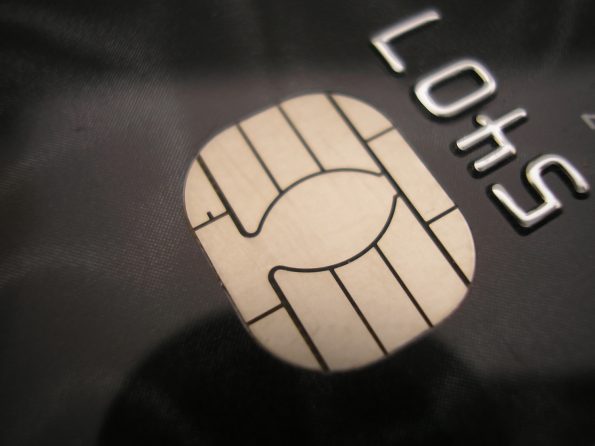In Canada, there are three main forms of payment; cash, debit, and credit card. You might see people use credit cards in stores to make purchases at the machine, but they can be used to make online purchases as well.
Let’s talk more about what credit cards are, how they work, and whether or not it’s a good idea to get one.
What is a credit card?
A credit card is a small, plastic card that is provided by a financial institution. On the front of the card, you will find a unique 16 digit card number, along with an expiry date, and your full name. This card allows you to borrow funds from the institution in the form of a line of credit (or a type of loan). You can then use this loan to pay for in-store or online purchases.
To pay for a purchase in-store, all you need is your physical credit card. Depending on the cost of the purchase, you may be able to tap your card at the payment terminal, or you may have to insert your card and enter your 4-digit pin number associated with the card (chosen by you).
To pay for an online purchase, you will need the 16 digit code on the front of the card, the expiry date of the card, the full name on the card, and the 3 digit CCV code on the back of the card (for security purposes).
Some retailers will also request the mailing address associated with the card. If the mailing address given does not match the address on the credit card, the purchase may not be approved.
How do Credit Cards Work?
Credit cards are given out by financial institutions as a type of loan. There are many different types of credit cards that you can apply for depending on your financial situation and your personal needs.
Each credit card has a credit limit. This limit is set by the bank and is the amount you are allowed to borrow. For example, if your card has a $2000 limit, the financial institution is allowing you to borrow up to $2000. This amount is reusable. In other words, if you pay off the balance on your card, you can use it again and again, as many times as you like.
Credit limits are not set in stone. By using your card regularly and keeping up with your monthly payments, you can request (or might even be offered) credit increases whereby you can borrow more money.
Of course, borrowed money does not come free of charge and every credit card has an interest rate. Interest rates will vary depending on who your credit card is with and what type of card you have.
They can also differ depending on what type of purchase is being made. Interest rates for credit cards are generally considered to be very high. Again, they can range depending on the financial institution, but interest rates for credit cards usually fall somewhere between 19-22%. Interest is charged anytime you do not make your monthly payment on time.
Benefits of a Credit Card
- Convenience
Credit cards are extremely convenient to use. As long as you have them in your wallet, all you have to do is pull them out and tap when you are ready to make a purchase. Simple, quick, and easy.
- Online Use
The main benefit of a credit card over a debit card is that you can use it to make online purchases. Unless you have a Visa Debit, you won’t be able to purchase anything online with your regular debit cards.
Credit cards allow you to shop from the comfort of your own home.
- Extra money when times are tight
When times are tight and you don’t have the extra money in your bank account, you can use your credit card to help tie you over until your next paycheck.
- Fraud Protection
Most Credit Cards do come with the benefit of fraud protection. This is especially true if you have a Visa or Mastercard. Fraud protection helps to protect you in the case that someone steals or finds your credit card, or uses your credit card number to make purchases.
You can report the incidents yourself by keeping a close eye on your credit card statements, or in some cases, the credit card company may even report unfamiliar purchases themselves.
- Builds credit
If you are able to make your monthly payments on time, using your credit card can help you to build your credit.
Cons of Using a Credit Card
- It can damage your credit
We just stated that if you are able to make your monthly payments on time, you can build your credit using a credit card. Unfortunately, you can also damage your credit if you aren’t careful.
Anytime you fail to make your monthly payments on time, this negatively affects your credit. So if you want to maintain a good credit score, you’ll also need to maintain a good payment schedule.
- It can lead to debt
It doesn’t take long for debt to rack up, especially with a credit card. Always remember that whatever you spend on your credit card needs to be paid back, with interest.
Racking up high balances can make it difficult to make your monthly payments, which can lead to a never-ending cycle of debt. So if you’re going to get a credit card, make sure you understand how to use it wisely.
- Interest and Fees
When it comes to interest and fees, there are few forms of loan that cost more than a credit card. Credit cards have extremely high interest rates. They also come with a long list of fees.
Depending on which credit card company you borrow from, you should also be aware of transaction fees, balance transfer fees, cash advance fees, late payment fees, and returned payment fees.
Each type of card differs in which fees they charge and how much they are, so be sure to read the fine print before signing on with any credit card company.
Is a Credit Card a Good Idea for Me?
Before you get a credit card, there are a few questions you should ask yourself:
- Can I afford a Credit Card?
Credit cards are a good idea for people who can afford them. This may seem counterintuitive because credit cards work like a loan for people who need the extra money but if you can’t afford to pay it back right away, you could get yourself into a boatload of debt.
You should only get a credit card if you have a stable income, aren’t already overwhelmed with bills, and are confident that you can make the monthly payments.
- What do I want a credit card for?
There are lots of different reasons that people might apply for a credit card. Perhaps they want to build credit, maybe they need it to make online purchases, or maybe they just don’t want to carry cash all the time – these are all good reasons to get a credit card.
You should NOT get a credit card for large loans or paying bills. There are many other options for this, and using credit cards for large purposes will cost you a lot more in the long run. It can also rack up debt that can be difficult to get out of.
- Can I be responsible with my credit card?
Credit cards make it easy to spend money that you don’t have. If you aren’t responsible with money or tend to make impulsive purchases, a credit card may not be the best idea for you.
Using your credit card for regular purchases can lead to poor shopping habits and can be detrimental to your financial health. If you tend to overspend, a credit card is not a good option for you.
How do I get a Credit Card?
In order to get a credit card in Canada, you will need:
- To be 18 years of age or older
- To be a permanent resident or citizen of Canada
- A social insurance number
If you have all of the above, you can apply for a credit card online. Just go to the credit card companies website and click “apply”. Some credit card companies will require a credit check before accepting your application, while others will not.
Once approved, your credit card will be sent to you by mail. From there, you will be given instructions on how to activate the card and then you can start to use it! It’s that simple.
In conclusion, credit cards can be a great way to build credit and borrow money for short periods of time, but you need to use them responsibly.












